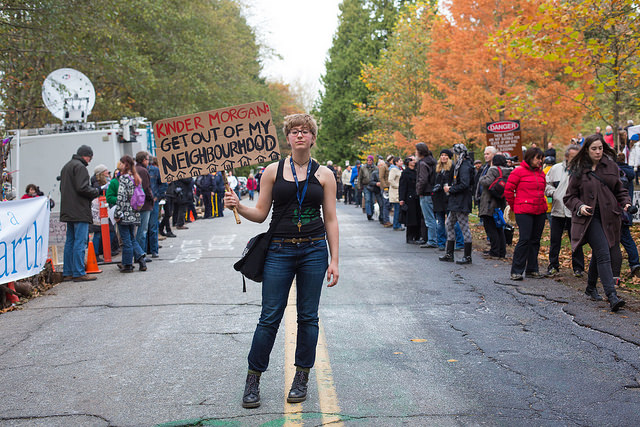The protest against Kinder Morgan’s pipeline spilled over into civil disobedience this week. By using injunctions and lawsuits against peaceful protesters, have the company and a complicit government opened the door to more radical resistance?
The limits of peaceful revolution
President John F. Kennedy once noted that, “Those who make peaceful revolution impossible will make violent revolution inevitable.” Decades later, this fragment from a largely forgotten speech is an obvious truism, albeit a truism continually lost on governments in most countries and at all levels. This applies in Canada as well where the notion of “peace, order, and good government” is largely a polite historical fiction.
In British Columbia, the federal government has allowed a foreign corporation to circumvent the Charter rights of Canadian citizens. Consider this: in order to fulfill its own political/resource agenda, the government has allowed Kinder Morgan, based in Houston, Texas, to cut down trees, drill holes and generally despoil a public conservation area. Protests by environmentalists and Native defenders of the land are met with SLAPP lawsuits and injunctions. The former is a form of nuisance lawsuit designed to financially intimidate those who protest. The latter is a “legal” means of having the state take sides in, and enforce a predetermined outcome for, a dispute between citizens and corporations. The protesters in this case are on public land, land that clearly belongs to all of us, not to Kinder Morgan. The intruder is the company, the very one doing the damage to the same public land.
The impact of the injunction is to allow a private sector intrusion onto public property while denying the public the same right of access. Those arrested and charged under such an injunction are prevented from returning to the site of arrest under penalty of being jailed for contempt.
On November 20, the injunction brought by Kinder Morgan was enforced by the RCMP. Dozens of protesters were arrested with more arrested over the next few days with the total now over 50. More arrests are certain to follow in the days and weeks ahead. In a country that prides itself on its Charter of Rights and Freedoms, how odd is it to arrest citizens for defending public space from a private entity?
Sadly, this is not a novel event, but one repeated all too frequently. Some will remember that the same techniques of SLAPP lawsuits and injunctions were successfully used to remove protesters from Eagleridge Bluffs before the 2010 Olympics. The protests ended and Eagleridge Bluffs was blown up in order to build a wider highway.
Not “if” but “when”
Temporarily, Kinder Morgan seems to have won a victory. Depending on the will of the protesters now, and in the future, this victory may stand. Or, it may fail, largely because of this fact of geography: Burnaby Mountain is indeed a mountain and a heavily forested one at that. There are many trails into the work sites of Kinder Morgan and the RCMP simply do not have enough members, not in Burnaby, not in B.C., not even in Canada, to secure the entire mountain. Determined protesters intent on disrupting Kinder Morgan operations simply cannot be kept off the mountain. Depending on what protesters are prepared to do, Kinder Morgan may have to spend a lot of time watching its back.
Again, it comes down to a contest of wills. Protesters have the moral high ground in their goal of preserving the mountain and blocking the pipeline; government in this case has the power to coerce, bribe, and punish. If hundreds or thousands of protesters show up, all determined to stop the pipeline, the state can perhaps arrest and incarcerate them all. But each arrest has a consequence. Every arrest uses up police and court resources and potentially further radicalizes others not yet committed. At some point, if the will of the protesters holds, government has to do one of two things: become still more repressive or withdraw.
The net impact of the current arrests may thus be less simple than hoped for by the company and government. Rather than having one protest camp that could be monitored, the RCMP and Kinder Morgan may have traded that situation for the potential of a guerilla protest on the mountain, one complete with those able and willing to “monkey wrench” the operations in the spirit of Edward Abbey’s The Monkey Wrench Gang”. And, as the late Utah Phillips once observed, “The earth is not dying, it is being killed. And those killing it have names and addresses.” Thus, Kinder Morgan’s potential future woes may extend far from the mountain to their five other addresses in Vancouver and surrounding areas. It could go further still.
Here in B.C., as elsewhere around the globe, many people are engaged in what is for now a peaceful revolution against those forces that would degrade the Earth. There is no denying that, so far, environmental protesters in B.C. have been totally non-violent against people and have routinely shown a commitment to avoid destructive means against property. This remarkable forbearance exists despite the assaults on nature that companies like Kinder Morgan perpetrate.
Almost inevitably, such restraint will eventually change as anger against companies like Kinder Morgan grows. The connivance of the government and courts with SLAPP lawsuits and injunctions may well fuel the belief that no civil remedies are possible and that the right — indeed obligation — of citizens to defend the Earth cannot be accomplished by “legal” means.
The current situation on Burnaby Mountain, the looming conflict of Northern Gateway, and a host of other environmental flash points around the world makes the likelihood of a frame shift from peaceful revolution to something very different seem less a question of “if” than of “when”.
Image: Flickr/Mark Klotz



